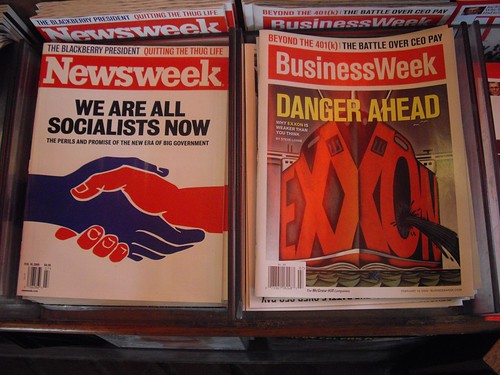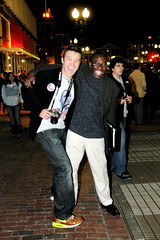I just finished Scott McClellan’s What Happened about his time in the White House and as the press secretary for the Bushies. It portrays McClellan as pretty much exactly the person I imagined him to be. Also, not a work of literature.
But when he talked about the state of political journalism he hit his stride, and a lot of what he said is worth keeping to hand:
To this day, I’m often asked about the “liberal media” critique. Is it true? Is the problem with Washing ton in part a result of the fact that left-wing journalist are, in effect, at war with conservative politicians and trying to bring them down?
My answer is always the same. It’s probably true that most reporters, writers, and TV journalists are personally liberal or leftward leaning and tend to vote Democratic. Polls and surveys of media professional bear this out. But this tilt to the left has probably become less pronounced in recent years, with the ascendancy of a wider variety of news sources, including Fox news, demonstrating the popularity and therefore commercial viability of conservative views. And more important, everything I’ve seen both as a White House press secretary and longtime observer of the political scene and the media, suggests that any liberal bias actually has minimal impact on the way the American public is informed.
The vast majority of reporters- including those in the White House press corps- are honest, fair-minded, and professional. They try hard to tell all sides of the stories they report, and they certainly don’t treat information or statements coming from a conservative administration with excessive harshness or exaggerated skepticism. And even when a bit of bias does seep through, I believe the public sees it exactly for what it is. We in the Bush administration had no difficulty in getting our messages out.
If anything, the national press corps was probably too deferential to the White House and to the administration in regard to the most important decision facing the nation during my years in Washington,the choice over whether to go to was in Iraq. The collapse of the administration’s rationales for war, which became apparent months after our invasion, should never have come as a surprise. The public should have been made much more aware, before the fact, of those uncertainties, doubts, and caveats that underlay the intelligence about the regime of Saddam Hussein. The administration did little to convey those nuances to the people; the press should have picked up the slack but largely failed to do so because their focus was elsewhere- on covering the march to war, instead of the necessity of war.
In this case, the “liberal media” didn’t live up to its reputation. If it had the country would have been better served.
I’ll even go a step further. I’m inclined to believe that a liberal-oriented media n the United States should be viewed as a good thing. When I look back at the last several presidential administrations- the two Bushes, Bill Clinton, Ronald Reagan, Jimmy Carter, Gerald Ford- I see a succession of conservative/centrist leaders. either right of center or just left of center, who pursued mainstream policies designed to satisfy the vast bulk of middle-class American voters. All of these presidents were at least moderate on economic policy, generally pro-business in their orientation, and within the mainstream on most other issues, from foreign policy to education to the environment. And the congressional leaders they worked with were, generally speaking, from the same mold- conservative or centrist. Over the past forty years, there have been no flaming liberals in positions of greatest power in American politics.
Under these circumstance, a generally liberal or left-leaning media can serve an important, useful role. It can stand up for the interests of people and causes that get short shrift from conservative or mainstream politics: racial and ethnic minorities, women, working people, the poor, the disenfranchised. As the old saying goes, a liberal reporter ought to take up the cause of “comforting the afflicted and afflicting the comfortable,” speaking out on issues that otherwise would be neglected or ignored, exposing wrongdoing, and helping to keep the powerful in government and business honest.
Furthermore, I welcome a media that are skeptical and untrusting. The more so the better- as long as they are honest and fair. Those who are in positions of power should have to continually earn the trust of the governed. They should be constantly challenged to prove their policies are right, to prove they can be trusted, and to prove they are accountable. That is the way we are more likely to get to the important, sometimes hard truths. In today’s information-based society, if a media outlet or journalist goes overboard they will pay the price… (bit about Dan Rather) …
So I don’t agree with those who excoriate the “liberal media.” As long as they do their job professionally, I have no problem with liberal reporters, and I certainly dealt with them happily enough as press secretary. The real problem with the national media is the over emphasis on controversy, the excessive focus on who is winning and who is losing in Washington, and the constant search for something or someone to pick on and attack. These bad habits too often cause the larger truths that matter most to get lost in the mix.
Any and all typos are mine, all mine.
He’s quite right that there isn’t actually much evidence of a liberal bias. Most actual studies that have gone by in my time as a journalist have indicated something more like conservative bias in political reporting. Of course these things are impossible to measure realistically, because someone has to pick the center in order to figure out which side of center something is, and the political center is the ultimate subjective quality in the universe.
I do think conservative views get taken more seriously, and that once a voice is established, reporting doesn’t know how to get away from it. Journalists tend to develop a self reinforcing list of experts. When you do an interview you want someone gloriously authoritative, so some of that can rub off on your reporting. Once someone is interviewed, they have more of that prestige, and it becomes harder to get away from them. That’s how we ended up listening to the same idiocies about the war in iraq and the mortgage market, to name a couple, over and over again, then had to hear the same people come back years later to say no one could have foreseen what was coming.
What was coming was painfully obvious.
I think when McClellan says “They try hard to tell all sides of the stories they report,” he’s actually talking about the false balance problem, which worked out well for him, but makes me want to beat my head against my desk. False balance is like watching someone make terrible algebra mistakes through a one way mirror. A balanced report about the state of, say, vote fraud would define it, and then tell you who is doing it. If one side is stuffing ballots or purging voter rolls and the other isn’t, that’s what you say. You explain the context of the fraud, and the history that lead to it. Balance in this case comes from investigating all sides.
False balance is much less work. Once you have a story on one side, you look for something, anything, related on the other. It’s different from trying to find the same thing on the other side, but you have to notice that you changed the meaning of what you’re talking about to catch false balance happening.
You write them up as equivalent, claim the story is about one thing even though it’s truly about two things, and go home early. This is how bad voter registration cards becomes the same thing as ballot stuffing or voter purges. If you actually sit back and think about it, voter reg cards are no where near the stories that purges or ballot stuffing are, because they don’t involve actual voting.
If Mickey Mouse showed up on election day- that would be a story.
False Balance means you don’t have to dig around as much, and even better, no one yells at you.
That gets to the other thing I think McClellan missed in this analysis. People don’t like getting yelled at and punished, and the severity of the punishment doesn’t actually make that much of a difference in how hard people try to avoid it. I think this resulted in a much more cowed and self censoring media over the last eight years. It’s very similar to what we talk about happening in the repressive Chinese media environment- say the wrong thing and you get a phone call no one wants to get. Here, it came with nasty phone calls and public shaming. The ultimate threat in China was being taken away in the middle of the night. Here it’s losing access to sources. Turns out the Chinese may have been trying too hard- you can get most of the compliance you want with a well placed cold shoulder. This is pretty in line with what we know about the psychology of social defection. People don’t want to do it, and that’s all it takes to game the media.
But McClellan’s vision of a good journalist as (these days) being liberal, afflicting the powerful and constantly making the government prove itself goes to the heart of the social contract of the press. Our checks and balances lie in being contrarians. The center and the right should have faced a liberal media for 40 years. And Hugo Chávez should face a conservative media. We’re supposed to be pains in the ass with very harsh ethical standards to obey.
The other thing McClellan nails is the loss of perspective that comes from increasingly inside baseball reporting. News stories going in depth on polls are kind of ridiculous. A report on how progress is going on an attempt to get people to react to something rather than how they are reacting is so conceptually convoluted and naval gazing I might have to have a lie down. Hence things like “covering the march to war, instead of the necessity of war.”
Completely separate from journalism one other thing about the book struck me. McClellan does a spirited endorsement of school busing when talking about his own childhood in Texas. Listening to it I couldn’t help but think, where was the Republican conservatism in this? I noticed after that every time he expressed his values he completely failed to sound Republican. His political values were totally out of line with the people he served and what he was accomplishing. People constantly end up this deep in structures without noticing that kind of thing. It’s kind of Milgram but with cocktail parties.
The entirely of What Happened can also be read as one huge positive book review for a book called The Permanent Campaign and Its Future which seems to have been quite the come to Jesus for McClellan. And yeah, now I kind of want to read that book. So What Happened was a pretty successful book review, laid out in the patterns of the suffering Scott McClellan along the rest of the nation.



 An Iraqi man grabs me from the crowd to take his picture, pointing at a button on his chest that says “Iraqis for Obama”, he asks me to not put his face in the picture. I pause. “I don’t think it matters anymore.” We both hesitate, realizing that really, something has changed. I take the picture, button, hands, and face.
An Iraqi man grabs me from the crowd to take his picture, pointing at a button on his chest that says “Iraqis for Obama”, he asks me to not put his face in the picture. I pause. “I don’t think it matters anymore.” We both hesitate, realizing that really, something has changed. I take the picture, button, hands, and face.